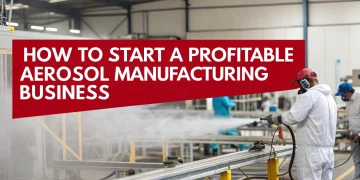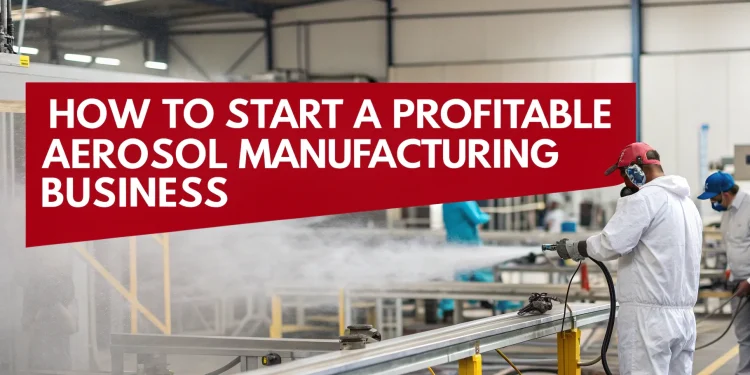Aerosols are now a part of everyday life, found in hospitals, homes, businesses, and even cars. Aerosol Manufacturing Business are used in a wide range of products, from deodorants to hair sprays, insecticides to automotive lubricants and industrial paints. They have become popular because they offer convenience, control and a long shelf-life. This industry is attractive to entrepreneurs because it offers a unique combination of consumer demand, industrial utility and export potential.
This guide will explore the basics of starting an aerosol business. It includes market opportunities, forecasts for demand, manufacturing processes and safety standards. This guide is designed for entrepreneurs and startups who want to establish a strong presence in a fast-growing industry.
Aerosol Manufacturing Business: What You Need to Know
Aerosols are a system where liquid or solid particles suspended in a gas under pressure are released by a valve upon activation. This packaging offers many advantages over the traditional formats. It protects the product against contamination, ensures accurate and consistent dispensing and extends the shelf life without excessive preservatives.
This Aerosol Manufacturing Business is very diverse. It includes personal care products such as deodorants and hairsprays, household items like air fresheners and sterilizers, medical devices, like inhalers, industrial applications, like lubricants and rust-prevention sprays, and other industrial applications. The variety of products allows manufacturers to reach multiple markets, from B2B to mass consumer goods.
The entry point for startups can be flexible. Others choose to specialize in niche products, such as eco friendly insect repellents and industrial cleaning sprays. One of the biggest strengths in this sector is its ability to adapt products and diversify them.
Related Articles: How to Start an Aerosil Manufacturing Business
Market Demand and Growth Forecast
The aerosol market is growing steadily worldwide, primarily driven by urbanization, lifestyle changes, and industrial development. The global aerosol market was valued at USD 90 billion in 2024. According to projections, it could reach USD 115 billion in 2030 with a growth rate of 4.5-5 per cent.
India’s industry is growing at a faster rate, with an annual growth rate between 6 and 7%. Demand is fueled by the increasing penetration of FMCG into semi-urban areas and rural areas. The automotive aftermarket industry has also boomed, as well as a growing consumer interest in hygiene and convenience. Aerosol-based cleaners and disinfectants have gained unprecedented popularity in the pandemic years.
In India, the fastest growing category is expected to be personal care aerosols. This includes deodorants, body sprays and other deodorants. Air fresheners, cleaning sprays and household products will continue to grow in popularity, while industrial aerosols are expected to see a steady demand along with manufacturing growth. Export opportunities also increase, especially in emerging markets with a still-developing aerosol market.

How to Build a Successful Venture
A business that manufactures aerosols requires more than machinery and raw materials. Entrepreneurs need to identify the market niche they want to target and make sure their product concept meets a demand. The key to success is often offering something unique, whether that’s an innovative formulation, a sustainable propellant or superior packaging that appeals the target audience.
It is important to have a well-researched, detailed business plan that outlines product categories, brand positioning, compliance requirements, and market positioning. It is equally important to build a strong supply chain that can source high-quality cans and valves. The reliability of these components has a direct impact on product quality and customer satisfaction.
View our Handbooks for more detailed information
Raw Materials and Core Inputs
The propellant and the formulation of the aerosol can be separated into two parts. The formulation includes the active ingredient, such as fragrance oils used in deodorants or insecticides used in pest control sprays. It also contains solvents, stabilizers and emulsifiers. The base product is created by mixing these ingredients.
When the valve is opened, the propellant gas is released. Propellers are commonly liquefied petroleum gasses like butane and propane, dimethylether, carbon dioxide and nitrogen. The type of propellant used depends on safety, environmental regulations, and the nature of the product.
The cans are also important, as they are made of aluminum or tin plated steel. Also, the valve mechanism is essential for controlled dispensing, and the labels or printed designs help to brand the product. The quality of the product at every stage, from raw materials to packaging, is crucial.
Aerosol Manufacturing Process
Aerosols are manufactured using volatile and pressurized substances. This is a highly precise process. The process begins with the formulation of the product, in which raw materials are measured and blended into stainless steel mixing tanks. To maintain consistency, temperature, viscosity and pH are closely monitored.
The formulation undergoes quality tests before it is transferred to the filling lines. Empty cans must be cleaned and dried to remove contaminants that may compromise the product. Filling can be different depending on the type of product and propellant. However, it usually involves adding the base formula to the can and attaching the valve. The propellant is then injected either through the valve or just before sealing.
The test for gas leaks is an important step. It’s usually done by submerging filled cans into a water bath, or using electronic sensors. The cans are then labeled, packed, and stored to be distributed after passing the quality check. Safety protocols must be followed throughout the entire process. This includes well-ventilated work areas, flameproof equipment and properly trained personnel who can handle pressurized gas.
Safety and Compliance Considerations
Aerosols are a business that is heavily regulated because they contain pressurized, flammable materials. In India, aerosols must meet Bureau of Indian Standards (BIS), and environmental regulations can dictate that propellants with low GWP or no CFC be used. Safety measures must be implemented in factories, such as explosion-proof electrical fixtures, fire suppression systems, proper ventilation, etc.
Labels must contain clear instructions on how to use the product, as well as warnings about hazards and disposal. Compliance with international standards such as ISO certifications and the European Union REACH regulations might be required for export markets. Compliance not only helps to ensure legal operations, but also builds customer and partner trust.
Related: Start a Bulk Solvent Business in India: High-Demand, High-Profit
Packaging and Branding: What is their role?
Packaging can be just as important in a market that is competitive as the product. The can’s color scheme, design and branding affect consumer perception and purchasing decisions. In the case of personal care products, aesthetics can be an important factor. For industrial products, however, durability and ease-of-use are more important.
Brand messaging should align with the product’s positioning–eco-friendly products should use recyclable materials and communicate sustainability, while premium products might focus on sleek designs and superior functionality. Packaging must always be functional, and the nozzles and valves should perform consistently over the life of the product.
Reaching the market
Aerosol distribution strategies vary depending on the target audience. FMCG retail chains and supermarkets are the most common distribution channels for consumer products, while industrial aerosols can be sold directly to businesses or through partnerships with equipment providers.
For a wider reach, marketing should combine traditional platforms like print and trade shows with digital platforms. Demonstrations, samples and retailer incentives are all ways to establish brand recognition in highly competitive categories. B2B clients often find that building long-term relationships with suppliers is more valuable than a single sale.
Innovative Growth and Innovation
Aerosols are ripe for innovations. The development of eco-friendly aerosols using water-based formulas and low-impact, non-flammable propellants is a promising area. The ability to customize products for specific niches, such as industrial sprays for specialized applications, gourmet cooking aerosols or therapeutic herb products, allows for differentiation.
The use of valves, packaging that is smart, and spray controls with precise control will improve usability and reduce waste. Entrepreneurs that invest in R&D will be better equipped to adapt to changes in regulations and consumer preferences.
Scaling up the Business
The scaling of an aerosol production operation can be done in many ways. Growth strategies include increasing production capacity via automation, expanding product range to cover new categories or entering export markets. Private label production in partnership with retailers and other manufacturers can generate additional revenue.
In order to achieve sustainable scaling, it is important to maintain product quality and efficiency in operations while adapting the marketing and distribution strategy to new markets. Building a strong brand during the first years of expansion will be more profitable and easier.
For more information check out related videos
How NPCS can assist
Niir Project Consultancy Services offers support for entrepreneurs who are interested in entering the aerosol industry. The company produces Market Surveys with Detailed Techno Economic Feasibility Reports that cover everything from manufacturing processes, raw material requirements and plant layouts to financial projections. NPCS provides clear data-backed insights to help entrepreneurs assess the feasibility of new ventures and their scalability, ensuring that they begin with a clearly defined roadmap for success.
Which business to start? How to choose a business idea?
Final Thoughts
Aerosol manufacturing is a lucrative business for entrepreneurs who are willing to combine market knowledge with technical precision. Its wide range of applications and steady demand as well as its innovation potential make it a great business for small and large-scale players. Understanding the market is key to success in this industry. You must also adhere to strict quality standards and comply with safety and environmental regulations.
The demand for spray products that are portable, reliable, and efficient will continue to grow as industries and consumer lifestyles change. This is a lucrative industry for startups who are prepared to tackle the technical and business aspects.


















